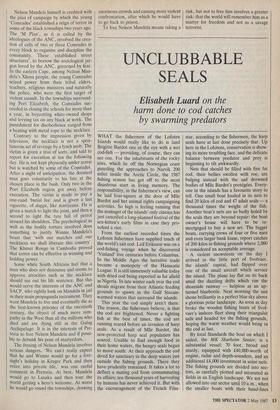UNCLUBB ABLE SEALS
Elisabeth Luard on the
harm done to cod catches by swarming predators
WHAT the fishermen of the Lofoten Islands would really like to do is land Brigitte Bardot one in the eye with a wet cod-fish — providing, of course, they can net one. For the inhabitants of .the rocky isles, which lie off the Norwegian coast guarding the approaches to Narvik 200 miles inside the Arctic Circle, the 1987 fishing season has got off to the most disastrous start in living memory. The responsibility, in the fishermen's view, can be laid four-square at the door of Mlle Bardot and her animal rights campaigning activities. So high is feeling running that the manager of the islands' only cinema has just cancelled a long-planned festival of the sex-kitten's early films in case they pro- voked a riot.
From the earliest recorded times the Lofoten fishermen have supplied much of the world's salt cod. Leif Eriksson was on a cod-fishing voyage when he discovered `Vinland' five centuries before Columbus. In the Middle Ages the lucrative trade became a monopoly of the Hanseatic League. It is still immensely valuable today with dried cod being exported as far afield as Nigeria. In late winter each year the cod shoals migrate from their Atlantic feeding grounds to spawn in the Gulf Stream- warmed waters that surround the islands.
This year the cod simply aren't there. The reason, the fishermen believe, is that the cod are frightened. Never a fighting fish at the best of times, the cod are running scared before an invasion of harp seals. As a result of Mlle Bardot, the now-protected harp seal population has soared. Unable to find enough food in their home waters, the hungry seals began to move south. At their approach the cod dived for sanctuary in the deep waters just outside the fishing grounds. There they have prudently remained. It takes a lot to deflect a mating cod from consummating its affairs; ten thousand years of harvesting by humans has never achieved it. But with the encouragement of the French Film- star, according to the fishermen, the harp seals have at last done precisely that. Up here in the Lofotens, conservation is show- ing its more troubling face, and the delicate balance between predator and prey is beginning to tilt awkwardly.
Nets that should be filled with fine fat cod, their bellies swollen with roe, are bulging instead with the sad drowned bodies of Mlle Bardot's protOgOes. Every- one in the islands has a favourite story to tell. One small boat hauled in its nets to find 20 kilos of cod and 47 adult seals — a thousand times the weight of the fish. Another boat's nets are so badly holed by the seals they are beyond repair: the boat owner's house will have to be re- mortgaged to buy a new set. The bigger boats, carrying crews of four or five men and even larger bank loans, report catches of 200 kilos in fishing grounds where 2,000 is considered an acceptable average.
A violent snowstorm on the day I arrived in the little port of Svolvaer, the islands' capital, had flipped over one of the small aircraft which service the island. The plane lay flat on its back amid the dazzling drifts which rim the shoreside runway — helpless as an up- turned bluebottle. Next morning the sun shone brilliantly in a perfect blue sky above a glorious polar landscape. As soon as day broke the wooden fishing boats of Svol- vaer's inshore fleet slung their triangular sails and headed for the fishing grounds, hoping the warm weather would bring in the cod at last.
By local Standards the boat on which I sailed, the MK Skarheim Senior, is a substantial vessel: 70 foot, broad and sturdy, equipped with £40,000-worth of engine, radar and depth-sounders, and an additional £4,000 investment in seine nets. The fishing grounds are divided into Sec- tors, as carefully plotted and measured as fields in an English landscape. We are not allowed into our sector until 10 a.m., when the smaller boats with their hand-lines have to return to harbour. As we butt through the morning waves in the icy air rival predators shadow us: a huge flock of black-backed gulls, a school of killer whales, a pair of white-tailed sea eagles. Torbjorn Skarheim, the boat's owner and skipper, scans the horizon as we cruise the limits of the grounds. There are 20 other boats waiting to enter too. In a normal year, Skarheim tells me, there would be 200.
Over the next six hours — our right to fish the grounds ends at 4 p.m. — we set and gather the nets three times. Each time our catch is 20 or 30 cod, and perhaps as many again of spiny redfish, pale and pop-eyed from the depths. The fish eagles swoop on the net as we winch it up. At least someone gets a square meal from our efforts. For Skarheim and his crew the day's haul is pathetic — less than 250 kilos. The proceeds will not even cover the cost of the day's fuel, let alone the crew's wages and all the other myriad expenses in- volved. Skarheim shakes his head grimly and we head back for harbour.
On the way home, as the sea-spray turns to ice on the curving panel of glass round the bridge, Skarheim tells me what he will do next. 'Tomorrow we will go out into the ocean, over on the western side. We know there are fish there — they are the ones that are too scared to come in. The trouble is they are even deeper than the shoals here, and out there we are competing with the big boys — your own British trawlermen, the Russians, the Icelanders, Canadians, everyone is out there. But we must do it, or stay at home and starve.'
Next morning on the old wooden quay of the nearby little fishing village of Henning- svaer, Johann Holst, a veteran local skip- per, was inspecting his night's catch. Lying in the snow at his feet were the freckle- furred corpses of six adult seals, bloodied where the flippers had been severed so that Holst can claim the £40 bounty. An adult seal needs 5 kilos of fish a day — a good-sized cod will do fine. Holst sets gill-nets, strung together along the sea bottom in weighted linked lengths and left overnight to fill. To the harp seals, the netful of fish must seem like one long supermarket counter.
`It's not just the damage to the nets and the loss of the catch,' Holst says. 'It's the way the seals die. Tangled in the nets they drown. Everyone here is a sailor and to sailors drowning is a terrible thing. In my father's day we hunted the seals from the ice. At least they died cleanly and there was some purpose to it. We used the skins and chopped up the fat with meat for winter stores. Now we can do nothing except watch them destroy our living and kill themselves as they do it.'
The day's catch of cod, such as it is, has already been gutted, salted and slung out on the wooden racks which dwarf the wooden houses lining the harbour. Hen- ningsvaer is suffering badly. Last year was a disaster too and two bad years in succes- sion are more than the little community can take. Already the cracks are showing. The population has fallen by almost a third as the men and the young leave to find work in Svolvaer or the mainland. There is a growing number of cases of child neglect due to alcoholism among the abandoned wives. Saddest of all, last autumn the kindergarten was closed after a toddler fell over the playground wall and drowned among the ice floes in the harbour — the village could not raise the money to make the wall higher and safer.
The protected seals are not the only culprits. Even the most dogmatic fisher- man acknowledges over-fishing in the past has something to do with it. But the seals are a constant reminder of the catastrophe and an understandable target for the islan- ders' anger and bitterness. Food chains are fragile everywhere but for thousands of years the links in the Arctic seas held together: killer whales preyed on seals, seals ate cod, cod fed on capelin, herring, and shrimp, and so on with no quarter, let alone quota, given. Man, until his recent change of heart, preyed on everything. The chief predator's sudden attack of conscien- ce is a new and perilous factor in the equation.
Which is why, as far as the cinema audience of Svolvaer is concerned, nobody wants to snuggle up to Mlle Bardot — even in her celluloid heyday. Whatever happens it seems inevitable that communities like Henningsvaer will go to the wall — in this case the famed Lofoten Wall. There is not likely to be much cod for anyone's dinner. As for the French sex-kitten — she, the islanders say, will no doubt be able to make do with cream.



















































 Previous page
Previous page